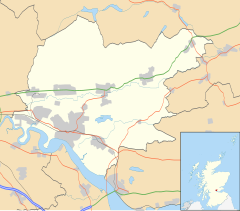Clackmannan, Clackmannanshire
Clackmannan
|
|
|---|---|
 Main Street and Tolbooth, Clackmannan |
|
| Clackmannan shown within Clackmannanshire | |
| Area | 0.40 sq mi (1.0 km2) |
| Population | 3,348 (2008 est.) |
| • Density | 8,370/sq mi (3,230/km2) |
| OS grid reference | NS911919 |
| Council area | |
| Lieutenancy area | |
| Country | Scotland |
| Sovereign state | United Kingdom |
| Post town | CLACKMANNAN |
| Postcode district | FK10 |
| Dialling code | 01259 |
| Police | Scottish |
| Fire | Scottish |
| Ambulance | Scottish |
| EU Parliament | Scotland |
| UK Parliament | |
| Scottish Parliament | |
Clackmannan (![]() listen ; Scottish Gaelic: Clach Mhanainn, meaning "Stone of Manau"), is a small town and civil parish set in the Central Lowlands of Scotland. Situated within the Forth Valley, Clackmannan is 1.8 miles (2.9 km) south-east of Alloa and 3.2 miles (5.1 km) south of Tillicoultry. The town is within the county of Clackmannanshire, of which it was formerly the county town, until Alloa overtook it in size and importance. According to a 2009 estimate the population of the settlement of Clackmannan is 3,348 residents.
listen ; Scottish Gaelic: Clach Mhanainn, meaning "Stone of Manau"), is a small town and civil parish set in the Central Lowlands of Scotland. Situated within the Forth Valley, Clackmannan is 1.8 miles (2.9 km) south-east of Alloa and 3.2 miles (5.1 km) south of Tillicoultry. The town is within the county of Clackmannanshire, of which it was formerly the county town, until Alloa overtook it in size and importance. According to a 2009 estimate the population of the settlement of Clackmannan is 3,348 residents.
The name of the town refers to the Stone of Mannan, a pre-Christian monument that can be seen in the town square beside the Tollbooth Tower, which dates from 1592.
During the twelfth century, the area formed part of the lands controlled by the abbots of Cambuskenneth. Later it became associated with the Bruce family, who, during the fourteenth century, built a strategic tower-house. It still stands above the town according to Historic Scotland, but entry is forbidden (because of subsidence).
A crater on asteroid 253 Mathilde is named after Clackmannan. Because Mathilde is a dark, carbonaceous body, its craters have been named after famous coalfields from across the world.
...
Wikipedia

